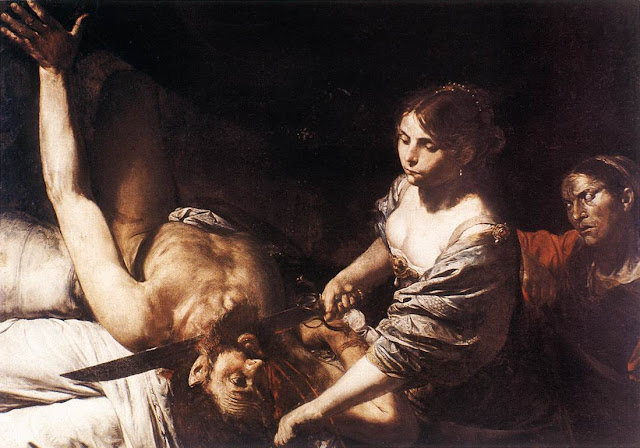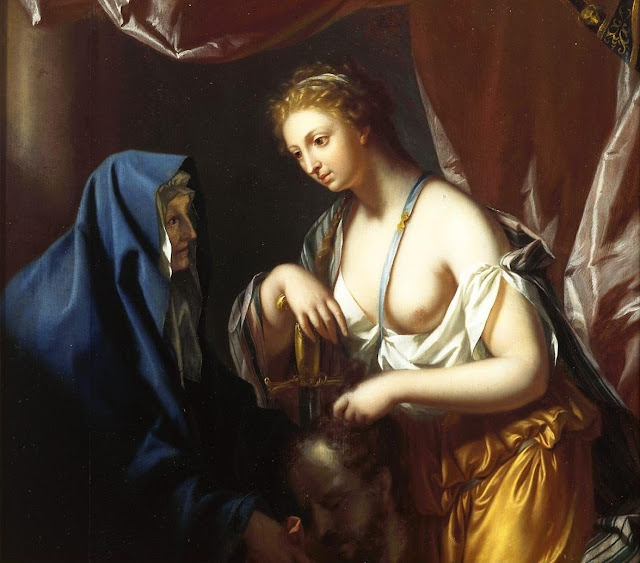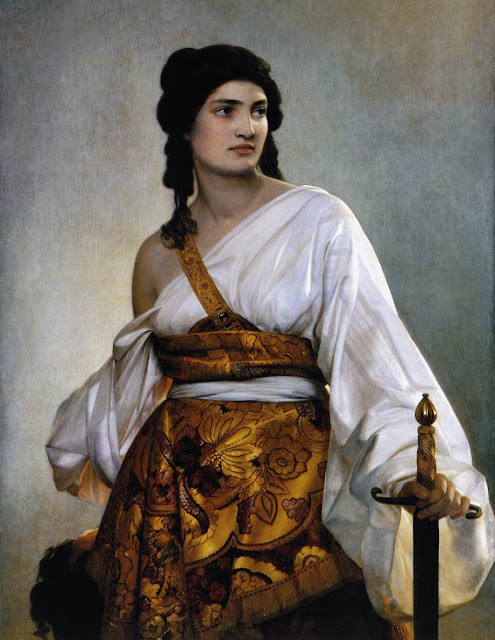Sandro Botticelli - The Return of Judith to Bethulia (1472)
.
Marco Palmezzano (1460-1539)
.
Giorgione (1504)
.
Master of the Mansi Magdalen (early 16th C.)
.
Michelangelo - Judith (detail, 1509)
.
Correggio (1512)
.
Titian - Judith with the Head of Holofernes (1515)
Note: There has been some argument about the identity of the woman
in this painting. The confusion arose because the decapitated head is carried
on a silver platter, traditionally the way that John the Baptist is depicted.
This would then make the woman Salome. But the adoring expression on the face
of the second woman suggests that she is Abla, Judith's servant, and this seems
more likely. It is generally accepted now that this is, in fact, a painting of
Judith, done at the beginning of Titian's career.
.
Lucas Cranach the Elder (1530)
.
Ambrosius Benson (ca. 1530-1535)
.
Jan Sanders van Hemessen (1540)
.
Anonymous Dutch Master (mid 16th C.)
.
Frans Floris the Elder (1550)
.
Lambert Sustris (mid 16th C.)
.
Giorgio Vasari (ca. 1554)
.
Philips Galle after Maarten van Heemskerck (ca. 1565)
.
Orazio Samacchini (mid 16th C.)
.
Jan Massijs (1570)
.
Jacopo Tintoretto (detail, 1579)
.
Paolo Veronese (late 16th C.)
.
Caravaggio (1598)
.
Palmo Giovane (early 17th C.)
.
Fede Galizia (early 17th C.)
.
Giovanni Bagilone (1608)
.
Artemisia Gentileschi (1611)
.
Christofani Allori (1613)
.
Peter Paul Rubens (1616)
.
Simon Vouet (attr., ca. 1618)
.
Orazio Gentileschi (ca. 1622)
.
Valentin de Boulogne (1626)
.
Johann Liss (1628)
.
Padovanino (ca. 1630)
.
Andrea Vaccaro (ca. 1630)
.
Guercino (ca. 1630)
.
Francesco Furini (1636)
.
Bartelomeo Mendozzi (ca. 1640)
.
Trophime Bigot (ca. 1640)
.
Luca Ferrari (undated)
.
Guido Cagnacci (ca. 1644)
.
Nicolas Régnier (mid 17th C.)
.
Jan de Bray (1659)
.
Onorio Marinari (mid 17th C.)
.
Pedro de Nunez Villavicencio (1674)
.
Antonio Bellucci (late 17th C.)
.
Gérard de Lairesse (1687)
.
Giovan Gioseffo dal Sole (ca. 1695)
.
Philip van Dijk (1726)
.
Francisco Goya (1823)
.
August Riedel (1840)
.
Alfred Stevens (1848)
.
Pedro Américo (1880)
.
Arnold Böcklin (1888)
.
Nikolaos Gyzis (1890)
.
Bela Cikos Sesija (1892)
.
Jules Lefebvre (1892)
.
Gustav Klimt (1901)
.
Koloman Moser (1916)
.
Franz von Stuck (1926)
.
Hans Hassenteufel (1928)
.
Kris Lewis (ca. 2010)
.
Carmen Mansilla (2014)
.
Nicola Verlato (undated)
.
Villa Mitchell (2018)
.
Daring and beautiful widow who saved Israel from the Assyrians by killing King Holofernes
.














_Acht_beroemde_vrouwen_uit_het_Oude_en_Nieuwe_Testament_(serietitel).jpg)















































Goed dat je ook Gentileshi hebt opgenomen. Wat een vrouw en schilder. In die laatste hoedanigheid overtroefde ze haar echtgenoot; het kostte haar haar huwelijk.
ReplyDeleteAls ik vanavond nog maar lekker kan slapen. Ik heb er een hard hoofd in.
ReplyDeleteMooie collectie!
@ingrid,
ReplyDeleteArtemisia overtrof als schilder niet alleen haar echtgenoot, maar wat mij betreft ook haar vader Orazio. Bij Danaë heb ik werken van vader en dochter achter elkaar gezet.
@aad,
Vrouwen kunnen gevaarlijk zijn - hoofd erbij houden kan geen kwaad.
In de voorbeelden die je geeft wint Artemisia het inderdaad van haar vader, die het voor die tijd allemaal wat simpeltjes houdt en zonder veel passie.
ReplyDeleteEr is iets bizar aan het schilderij van Riedel.
ReplyDeleteHet voelt niet als een werk uit 1726.
Het lijkt wel alsof het recent werd gemaakt. Vooral de details die in het gelaat van Judith, geaccentueerd worden lijken te refereren naar een veel hedendaagser schoonheidsideaal.
Vergis ik me?
Groet
- Dauw -
@DagEnDauw,
ReplyDeleteGoed gezien! Een slippertje van mijn kant. De Judith van Riedel dateert uit 1840. Dank voor je opmerkzaamheid.